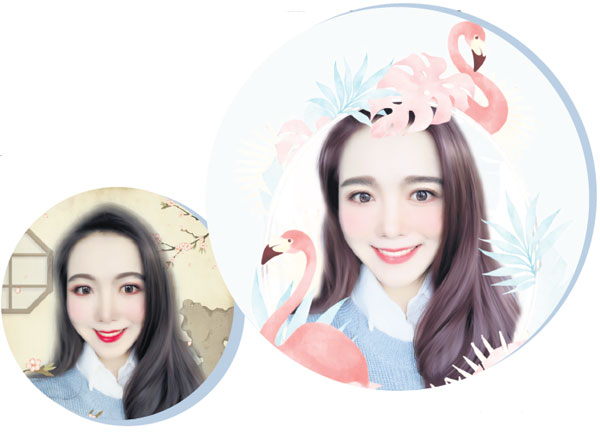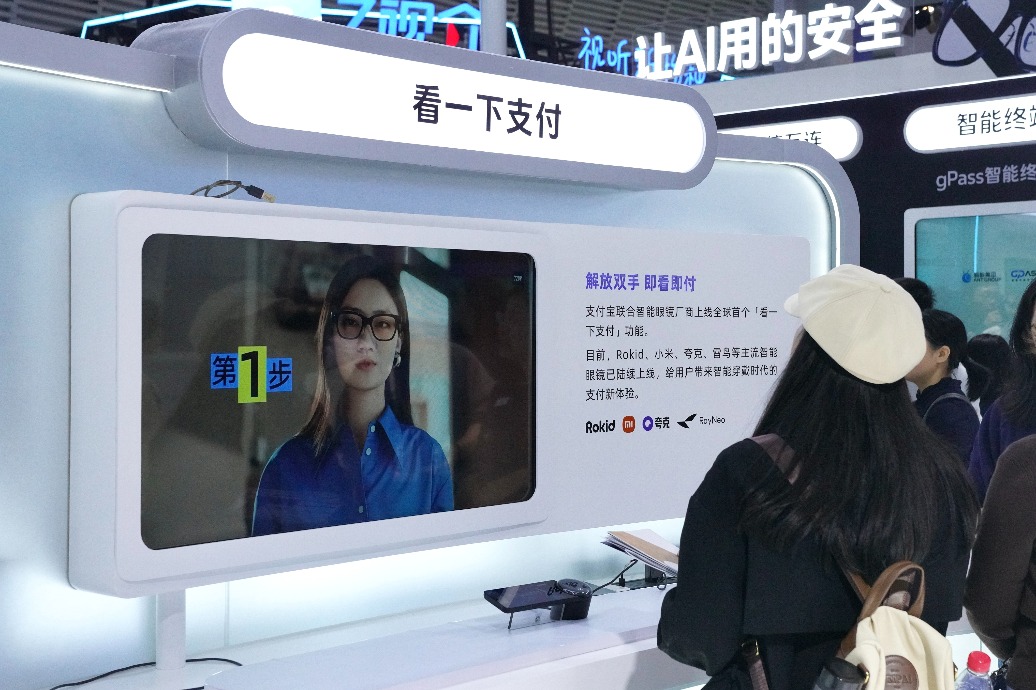I'm not quite my selfie today!

A growing number of Chinese are using photo-editing apps to modify their pictures to 'look better' and to curate their images
The photos were taken. But they weren't ready. Far from it.
Ye Qian and her friends had snapped shots of a group gathering. Then, they dropped their heads over their phones, backs hunched as they operated editing apps to ensure everyone's image was perfectly polished before posting them online.
"It's a common scene at gatherings of friends," Ye explains.
| Like waving magic wands, young people apply photo-editing apps to get good or funny looks, to express their emotions and share them with friends on social-media networks. Photos Provided to China Daily |
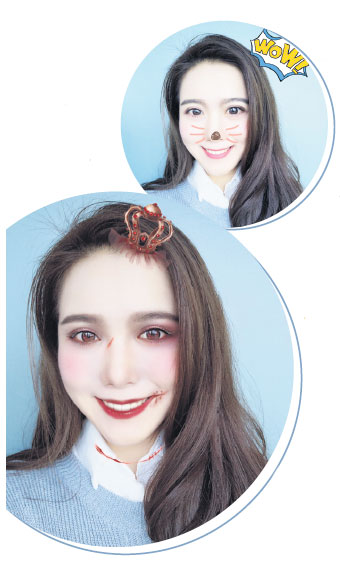
"You have to modify the photos before sharing them. Everyone does it. We want to alter the photos to look better, usually giving people slimmer faces, larger eyes, flawless skin and longer legs."
The 23-year-old postgraduate student at a university in Hubei's provincial capital, Wuhan, has 15 apps for modifying photos on her iPhone. Each has a specific function for a specific subject - some for selfies, some for landscapes, a few for pets.
Such photo modification is an open secret, Ye says. All her friends do it, men and women.
"It's completely accepted," she says.
"If I only edit my own image in a group photo, the others will hate me."
Consequently, such apps are flourishing in China.
About 332 million Chinese have downloaded photo-editing apps, according to a November report released by data analysis company Jiguang.cn. Nearly half of Chinese with smartphones - mostly people younger than 30 use such apps, and the average user in the country has more than 2 per phone.
More than 3,400 such apps are on the market, the report says.
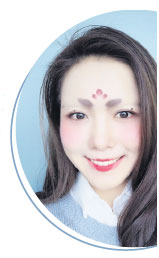
"Photo editing is a new tool for people to manage their online images, so these apps enable them to present themselves as they wish on the web," says Beijing Foreign Studies University internet culture expert Dong Chenyu.
Manipulating one's appearance in the real world is difficult due to body language, facial expressions and tone. But cyberspace enables one to not only control but also alter their presentations.
"These apps make people's obsession with perfection possible to actualize," he adds.
But 25-year-old Xie Qi believes the apps aren't fast or convenient enough. So the human resources worker at a college in Zhejiang province's Wenzhou bought a smartphone specially designed to take beautiful selfies years ago.
It automatically renders skin flawless, faces slim, eyes large and irises colorful.
She usually takes two phones with her when she goes to parties or on trips her "selfie smartphone" and one for ordinary use.
"Many of my friends also have two phones," she says.
"We're not perfect in real life. But altering our photos makes us appear beautiful and confident."
Xie still uses apps, even with her specialized phone, and spends five to 10 minutes editing each photo. She sometimes seeks friends' advice on creating perfect images.
Her mother also uses apps to remove wrinkles. Xie agrees this is a good way for her mom to present an idealized self on such social-media platforms as Instagram and WeChat in the hope of getting as many likes as possible.
Xie posted lots of selfies during her college years.
But she is more selective after graduation, since she views curating her online image as a priority.
"I can tell if a photo has been modified immediately upon seeing it," she says.
"I don't like ones that are too heavily edited. I make moderate modifications. At least my friends are able to recognize me." Dong says this is typical when users know that people familiar with them will see their posts.
"They balance their true selves with their idealized selves when editing."
Still, overedited and even fake photos are common online, especially with the rise of internet stars.
Freelancer Xing Hanna says her friend was recently duped by altered photos when she selected a model to pose with her product from a group of portraits provided by web celebrities.
Her team was shocked when the woman looked nothing like her pictures.
"Photo-editing apps help online stars curate their appearance. But it's easy for ordinary people to worry about imperfections."
Xing is conventionally pretty and says she was praised as such while growing up. But she began to feel less secure as she was bombarded with overedited photos of beautiful women.
Her best friend, a good-looking woman, often asks if she should get plastic surgery. Xing's friends often ask: "Why is my chin not as long as online stars'? Maybe my eyes are too small? Why do they look so pretty in photos but I don't?"
Xing sometimes doubts herself through hearing such questions so often.
She knows these celebrities' person as exist only on social networks. They post perfect pictures but also claim ordinary backgrounds, which confuses the public. "I know those photos are edited," Xing says.
"But we can't help but compare ourselves with them."
Dong points out that new trends and technologies usually bring new problems.
People need time to learn how to cope. He says that studies have shown publishing moderately edited photos on social media makes people happy, and these apps are to physical appearance what clothes are to fashion.
"People are born to pursue beauty," Dong says. "It's fundamental. These apps satisfy this drive."
dengzhangyu@chinadaily.com.cn
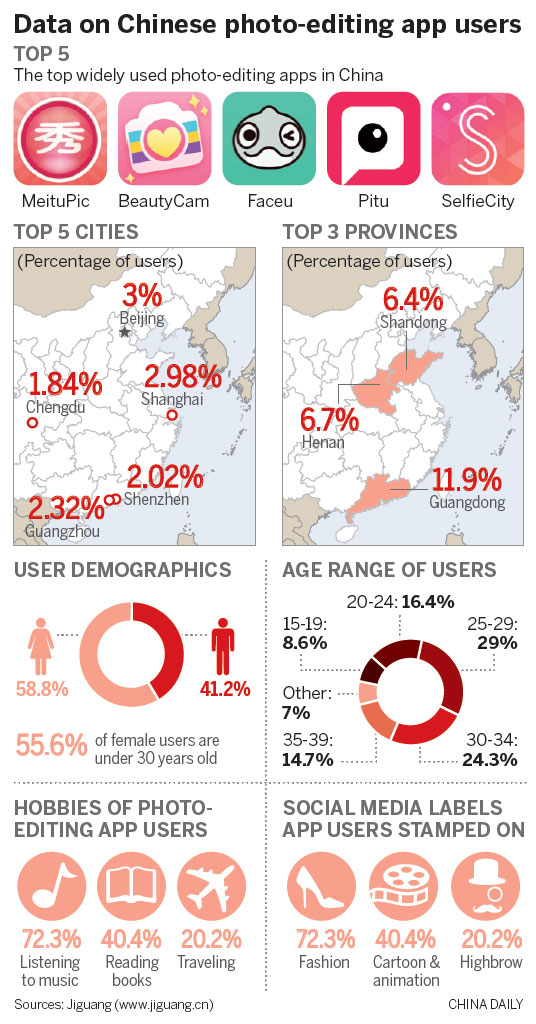
(China Daily Africa Weekly 06/30/2017 page21)
Today's Top News
- Crossing a milestone in the journey called Sinology
- China-Russia media forum held in Beijing
- Where mobility will drive China and the West
- HK community strongly supports Lai's conviction
- Japan paying high price for PM's rhetoric
- Japan's move to mislead public firmly opposed
















